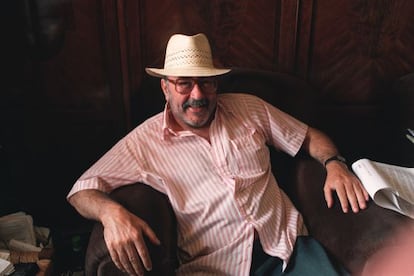Veteran war reporter dies aged 72
Manu Leguineche passed on the secrets of his trade to hundreds of other journalists


Veteran reporter and war correspondent Manuel Leguineche, who died on Wednesday morning in a Madrid hospital at the age of 72, once wrote that World War II began in his home town of Gernika.
War always figured prominently in the life of this man of peace, who was one of the greatest Spanish journalists of all time, as well as being the founder of two press agencies (Colpisa and Faxpress), the author of two dozen books and hundreds of articles, an inveterate globetrotter, an extraordinary player of Spanish card game mus, and a diehard fan of the Athletic de Bilbao soccer club (“To the death!” as he used to say).
Manu, as everyone in the media sector used to call him, spent the last years of his life in seclusion in his house in Brihuega (Guadalajara), weary from his battle with disease.
He won every Spanish journalism award available, from the National Journalism Prize to the Ortega y Gasset Prize and the Medal of the Constitutional Order.
Dozens of youngsters felt the calling to journalism after reading his work
Yet his greatest legacy is having taught the trade to hundreds of other journalists, either personally or through his open-minded, cosmopolitan articles. His quick, agile, educated and entertaining prose was inimitable. Unfortunately, much of his work is out of print.
He used to say with pride that dozens of youngsters had felt the calling to become journalists after reading his masterpiece El camino más corto (or, The shortest road), a tale of an extraordinary trip around the world in a jeep. And he was quite right.
His media career began in the Bilbao weekly Gran Vía, and later he moved on to one of Spain’s best places to learn the trade at the time, El Norte de Castilla, a newspaper from Valladolid then run by the acclaimed writer Miguel Delibes.
Very early on, Manu realized that his own media universe was not in Franco’s Spain but in the Third World, at a time of post-colonial warfare that gave birth to many new countries. It was a world full of optimism and tragedy, and Manu told Spanish readers about it like nobody else.
We need to look where the TV cameras do not go,” he once said
“I think that Vietnam is what we had instead of happy childhoods,” was one of his favorite sentences, which he took from the seminal New Journalism book Dispatches, written in 1977 by the US war correspondent Michael Herr, with whom Manu had been on familiar terms given that they were part of the same gang of journalists at the Continental Hotel in Saigon.
Leguineche wrote his own story about Vietnam, La guerra de todos nosotros (or, Everyone’s war). “Vietnam was a classic of the journalism of our time. Now you have to move based on the market. I was caught up in that war, and in the Asian wars, while I was traveling around the world, all of which I later recounted in El camino más corto. I was right there where things were happening,” he told EL PAÍS in one of his last interviews, granted in January 2007.
He traveled across all the continents to cover dozens of conflicts, disasters and elections. To read his articles is to follow all the major events of the 20th century, from the Vietnam War to the conflict between India and Pakistan, the Yugoslav wars, the fall of the Soviet Union and the first Gulf War.
“I am fascinated by the world. I always felt that need to run away. I met other people, other worlds, other ways of being,” he once said in 2007. “That is why I say that the shortest road to get to know yourself is to travel around the globe. Years ago, I was humbled at the Milan train station when I got off the train and read a sign that said, ‘We are all tourists.’”
Only disease managed to keep him at home. Manu missed the boat of the digital revolution but in 1992, when he accepted the Ortega y Gasset Prize, which is awarded by EL PAÍS, he made a very relevant statement about the changes that would soon affect the profession.
“We Gutenberg Galaxy [journalists] have to learn how to readjust our sights, because live television has changed everything... Why repeat what everyone’s already seen on CNN? More and more centuries seem to pass between CNN’s coverage and the publication of your story in the newspaper, never mind the magazine. We need to say goodbye to a narrative description of the facts, and look where the TV cameras do not go, describe the precedents and the consequences, uncover the secret environments.”
Manu wrote dozens of essays, and it might almost be said that he invented a genre all his own, mixing travel writing, investigative journalism and history. He wrote a single novel, La tribu (or, The tribe), a story about journalists in Equatorial Guinea during the fall of the dictator Francisco Macías. He used to say sarcastically that he would never write another piece of fiction again, but his description of foreign correspondents as “the tribe” caught on. He also used to say that all correspondents suffer from the three D’s: depression, divorce and dipsomania (alcohol cravings).
Every good thing one hears about Manu is very likely true: he was a generous man (if a solitary one), always ready to help out a newbie reporter or send bottles of wine to his friends. On the occasion of the 25th anniversary of the Cirilo Rodríguez award, a group of journalists paid tribute to Manu Leguineche, the unquestionable leader of the tribe. And Manu, who was already quite ill by then, dropped a great quote: “I am here to prove that all wars are lost.”
Hopefully, eternity is an endless trip around a world in peace. Or even better, one long game of mus.
Tu suscripción se está usando en otro dispositivo
¿Quieres añadir otro usuario a tu suscripción?
Si continúas leyendo en este dispositivo, no se podrá leer en el otro.
FlechaTu suscripción se está usando en otro dispositivo y solo puedes acceder a EL PAÍS desde un dispositivo a la vez.
Si quieres compartir tu cuenta, cambia tu suscripción a la modalidad Premium, así podrás añadir otro usuario. Cada uno accederá con su propia cuenta de email, lo que os permitirá personalizar vuestra experiencia en EL PAÍS.
¿Tienes una suscripción de empresa? Accede aquí para contratar más cuentas.
En el caso de no saber quién está usando tu cuenta, te recomendamos cambiar tu contraseña aquí.
Si decides continuar compartiendo tu cuenta, este mensaje se mostrará en tu dispositivo y en el de la otra persona que está usando tu cuenta de forma indefinida, afectando a tu experiencia de lectura. Puedes consultar aquí los términos y condiciones de la suscripción digital.








































